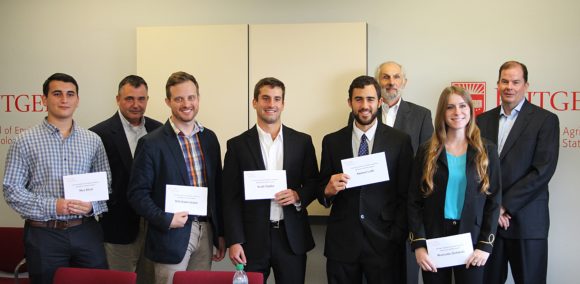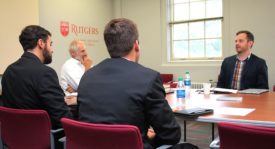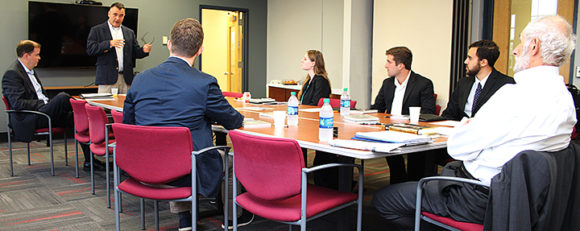
Inaugural class of Ag Scholars and program leaders (l-r): Max Blatt, Steve Komar, Will Habermann, Scott Taylor, Ameen Lotfi, Ira Polk, Maryann Zielinski and Brian Schilling.
The Clearing Corporation Charitable Foundation (CCCF) Agribusiness Scholars program provides selected students matriculating at the Rutgers School of Environmental and Biological Science with the applied knowledge, leadership qualities, analytical skills and experiences required for successful careers in the domestic and global agribusiness sector. Instituted in the spring of 2017 from a $1 million endowment from CCCF, the first group of students were welcomed to the program during the inaugural class on September 26. Five students are embarking on this two-year program which comprises 15 credits of coursework as well as participation in academic enrichment activities.
In addition to developing an in-depth understanding of the issues driving agricultural markets and the performance of the agribusiness sector, the students will gain many soft skills to enhance building their careers. The inaugural meeting began on that note – introducing the five selected students to the key people who will guide and mentor them through the program, along with providing sage advice to establish a strong foothold on the career ladder.
Associate professor Stephen Komar, Rutgers Cooperative Extension director Brian Schilling and CCCF director Ira Polk welcomed the students to the program. Komar began by highlighting the special emphasis of the curriculum, “What really excites us about this program is it is one of the few programs in academia, particularly in the School of Environmental and Biological Sciences, that we have leaders in the academic world and leaders from the business and corporate world interacting with students that are just going out and starting their careers.”
Rather than provide a precise definition of agribusiness, Komar emphasized its vastness. “You’ll learn as you’re going through the program just how broad agribusiness is. Agriculture and agricultural products go through the entire economic sphere. The increasingly global agricultural supply chain encompasses farming at all scales, food processing and distribution, and a host of supporting sectors that include futures and trading, regulation, finance and logistics.”
The program is built around student interaction with industry and public sector leaders to cultivate hands-on business know-how – something university students don’t usually learn in the classroom. Schilling said, “One of the things that motivated this program is that we have so many bright students, but what employers often say is the students are really smart, but they just don’t know how to do things. What that means is having the practical experience of knowing how to get things done: how to interact with people; how to resolve conflict; how to work with people that you fundamentally might disagree with in order to achieve organizational goals.”

Ira Polk listens while Will Habermann shares his motivation for participating in the program.
The co-curricular nature of the program will involve getting real-life expertise from highly successful people in various fields. That feature of the program kicked in full swing at the inaugural meeting, with Polk indulging the students with a wealth of business-savvy advice.
Conventional advice counsels on respecting one’s superiors and going to the top when seeking advisement. Polk’s advice provided a broader perspective, “You always have to respect the person you’re talking to. You may not agree with them but it doesn’t matter–you still have to respect them–whether that’s up or down. It could be the operations worker, or it could be the president. The person who is working and hammering that nail every day is working hard doing the best they can, but they also understand how to build something. Don’t underestimate the worker on the line.”
Respecting others was further emphasized by Polk, “Don’t ask others to do what you wouldn’t do if you had the ability,” and “try to put yourself in the other person’s shoes; it makes communication easier.”
Meet the Agribusiness Scholars Inaugural Class
Below are the students, their majors, and what motivated them to enroll in the Clearing Corporation Charitable Foundation (CCCF) Agribusiness Scholars program:
Ameen Lotfi (Agriculture and Food Systems): “I thought about agriculture because I want to change the world in a quiet way, but then I realized that my tomatoes are not going to save the world. I’m more interested in building communities up. I’m thinking about the potential in building businesses and value-added products and putting money into communities that don’t have it and building from the bottom up.”
Scott Taylor (Agriculture and Food Systems): “I work at a nursery six days a week and through the heat of the summer. I enjoy that a lot, but I don’t want to do that the rest of my life. You’re always going to need agriculture–it’s not going to be something that fades out over time or be automated, and it’s really important for the U.S. to be agriculturally self-sufficient. It’s important for our farmers to be able to have access to markets all over the world and not just our country.”
Maryann Zielinski (Animal Science, Production Animal Specialization): I’ve always been drawn to agriculture ever since I was a kid and there’s just something about farms that always interested me. I’d like to teach kids how farming works and get kids into ag–that would be a great way to impact our future. I’d like to explore how to get fresh food from farms into cities where people need it most. Another thing I’d like to explore is how we can make sure farmers make a profit.”
Max Blatt (Environmental and Business Economics): “I’m looking for a way to diversify my skills and meet people in the industry and find out more about it. I don’t have a background in agriculture and pursued the program to explore options in this globally important sector.”
Will Habermann (Food Science): “I’m a non-traditional student, so I’m a little older and have some experience in marketing and advertising. I’m in the midst of a career change and my passion in life has always been food. I like cooking, and people have to eat, so that would be a great thing to go into business-wise. Through this program I look forward to exploring the big topics in agribusiness, talking to people who have experience in the industry and life, and picking their brains. I always assumed that leadership was a born talent, but I’m slowly learning that it is something that has to be practiced and cultivated.”

Steve Komar initiates the orientation with an overview of the program.

